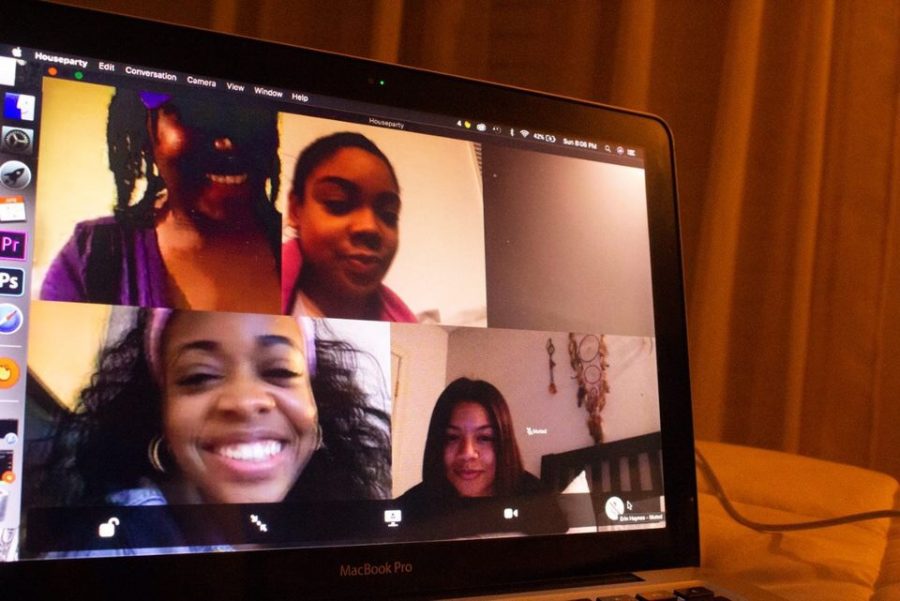Tired of Social Distancing? Have a Houseparty!
Skyy Haynes, Megan Haynes, Linton Smith, Heather Haynes, and Erin Haynes take their “cousin chat” to Houseparty on April 12,2020. The video chat Houseparty allows users to stay connected during quarantine. Photo credit: Erin Haynes
April 22, 2020
For most, the one human face we see in-person nowadays is our own reflection. Self-isolation may be lowering the curve for coronavirus cases, but people’s loneliness is growing to new heights as quarantining continues.
But, the popular video chatting app, Houseparty, is proving that people can still “party” alone, together.
“Typically, my friends and I, on Wednesday nights we would have a game night and the Houseparty app helps us maintain that sense of normalcy of the college experience,” said music industry senior Wendolyne Rodriguez.
Since the state ordered a mandatory stay-at-home order, Rodriguez’s social-life is “non-existent” and parting from her college dorm roommates was drastic. But Houseparty helps her feel like a somewhat normal 21-year old, said Rodriguez.
“[Houseparty] is very reminiscent of how I used to socialize with my friends back in middle school, and I’ve kind of gone back to being 11-years old but on the adult-version of Skype,” said Rodriguez.
Unlike other video chatting apps, Houseparty focuses on gatherings, celebrations, and connecting with loved ones to have fun, according to Houseparty’s spokesperson Kelsey Grady.
“We have four free games in the app and it helps people have a purpose while connecting and have a lot of fun while doing it,” said Grady.
Grady said statistics show that most people want to spend quality time with their friends on other apps but 74% of users don’t socialize together on their social media.
“We emphasize that Houseparty is a home online. You decide when you want to open it to friends, what friends come over, and what you do when they’re there. You have the keys and can make it as open, or as private, as you want. And, of course, your home is where you can always be yourself,” said Grady.
Sticking to its core, people are still hosting birthday parties, baby showers, holiday family gatherings and more using the app, said Grady.
The shift to the new normal is not surprising because humans are social creatures who do well by working with each other, said founder and director of the Digital Well Being Lab, Anna Lomanowska.
“Numerous studies of social isolation and loneliness at different phases of life show that those individuals who have strong social connections and frequent social interactions tend to be healthier and live longer,” said Lomanowska.
Video chatting is the closest we can get to face-to-face communication and it is a good time to learn how to use technology in times when we need it most, said Lomanowska.
“It’s also a good time to engage people who normally wouldn’t use this technology (e.g., seniors) and this may prove to be a useful lifeline going forward for those who normally experience greater social isolation. This is an opportunity to rethink our relationship with these technologies and to hopefully make them work to benefit us more,” said Lomanowska.
Joseph Haynes, a 64-year old father of two never thought he would retire his regular phone calls for video chats using his daughters’ computers.
“It’s crazy that people can see and talk to each other from an app…I am happy to see that everybody [on Houseparty] is getting along and look like they are having a good time when we can’t travel,” said Haynes.
Haynes’s first time video chatting with friends and family made him realize that the best thing people can do during quarantine is to socialize and have a good time, even if it means partying “alone” at home, said Haynes.
“There is a comfort and pleasure in re-enacting our routine of getting ready to go out. It’s also a way to distract from the daily challenges of this situation by having something to look forward to and get ready for,” said Lomanowska.
Video chatting has skyrocketed since the pandemic and is bringing people closer than ever, which begs the question of the fate of socializing in the future.
Even if quarantining ends, people could take precautions for a long time because the coronavirus is changing how we interact, said Lomanowska.
“The reality is most people still have family and friends who don’t live near them that they want to connect with. We hope they keep using Houseparty to do so,” said Grady.
Whether or not the pandemic changes how we communicate with each other for the long-term, we are just a few clicks away from being closer together.
“I will definitely still use [Houseparty] after all of this is over because instead of sending a text or an email, my friends and I can think about the pandemic and how we went through it and it will be a nostalgia kind of thing,” said Rodriguez.








